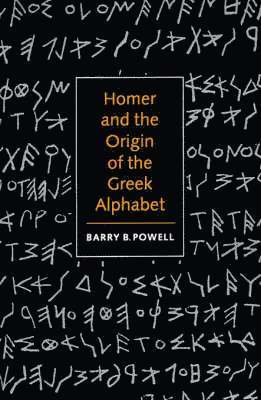
- Format
- Häftad (Paperback)
- Språk
- Engelska
- Antal sidor
- 308
- Utgivningsdatum
- 1996-10-01
- Upplaga
- New e.
- Förlag
- Cambridge University Press
- Medarbetare
- Barry B., Powell
- Illustrationer
- 6tabs.11figs.4M.
- Dimensioner
- 353 x 98 x 20 mm
- Vikt
- Antal komponenter
- 1
- Komponenter
- 2:B&W 6 x 9 in or 229 x 152 mm Perfect Bound on Creme w/Gloss Lam
- ISBN
- 9780521589079
- 463 g
Homer and the Origin of the Greek Alphabet
- Skickas från oss inom 7-10 vardagar.
- Fri frakt över 249 kr för privatkunder i Sverige.
Passar bra ihop
De som köpt den här boken har ofta också köpt Taming 7 av Chloe Walsh (häftad).
Köp båda 2 för 778 krKundrecensioner
Fler böcker av Barry B Powell
-
Greek Poems to the Gods
Barry B Powell
-
Homer
Barry B Powell
-
Writing
Barry B Powell
Recensioner i media
' ... this is a book which is as remarkable for the ingenuity of its answers to difficult questions as it is for its useful review and compelling display of so much of the relevant evidence.' Bryn Mawr Classical Review
'[This] is an important book, and will be widely read by students of writing in other cultures as well as by Homerists, linguists, historians and archaeologists of early Greece.' Classical Philology
Innehållsförteckning
Foreword: why was the Greek alphabet invented? 1. Review of criticism: what we know about the origin of the Greek alphabet; 2. Argument from the history of writing: how writing worked before the Greek alphabet; 3. Argument from the material remains: Greek inscriptions from the beginning to c. 650 BC; 4. Argument from coincidence: dating Greece's earliest poet; 5. Conclusions from probability: how the Iliad and the Odyssey were written down; Appendix I: Gelb's theory of the syllabic nature of West Semitic writing; Appendix II: Homeric references in poets of the seventh century.
Du kanske gillar
-
Familiar
Leigh Bardugo
HäftadDeath's End
Cixin Liu
HäftadThree-Body Problem
Cixin Liu
HäftadFrågor & svarDune
Frank Herbert
HäftadA Court of Thorns and Roses Paperback Box Set (5 books)
Sarah J Maas
Mixed media productFourth Wing
Rebecca Yarros
Häftad


